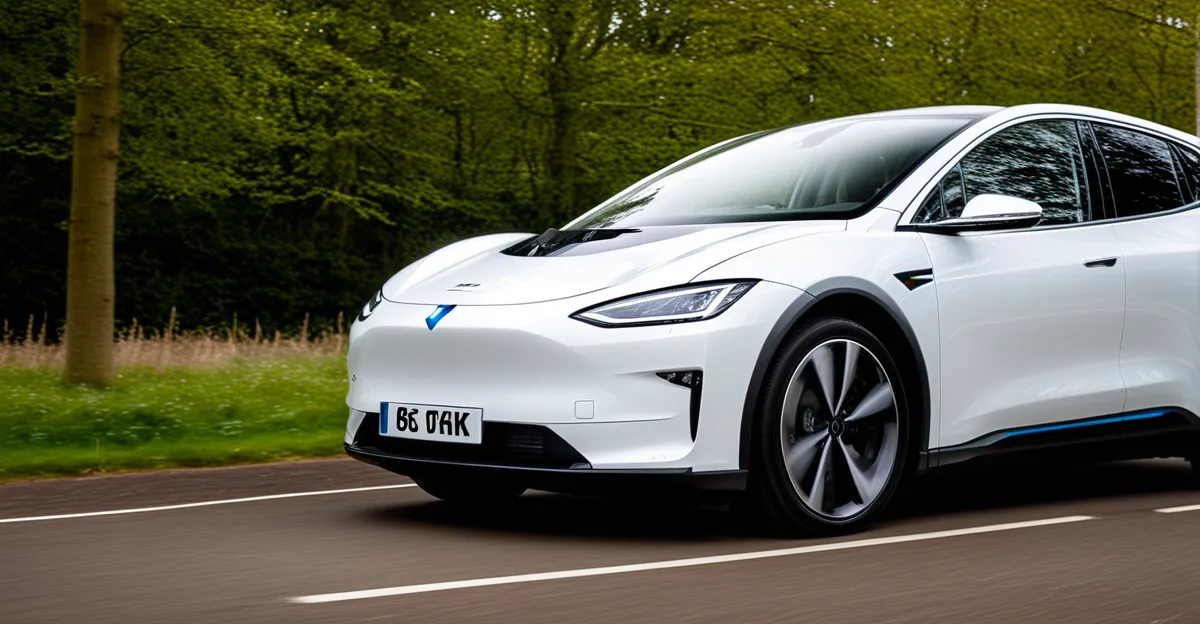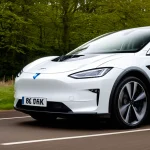Overview of Electric Vehicles and the UK Automotive Industry
Electric Vehicles (EVs) are rapidly transforming the landscape of the UK Automotive Industry. These vehicles, powered entirely or partially by electric power, have witnessed a significant increase in adoption due to their environmental benefits and innovation in EV Technology. As the UK aims to reduce its carbon footprint, the rise of EVs is instrumental.
The current state of the UK Automotive Industry reflects a dynamic shift with traditional automakers increasingly investing in EV production. This transition is vital for staying competitive as market trends lean towards sustainability and lower emissions. Understanding these dynamics is crucial to grasping the potential long-term impacts on both the economy and the environment.
In parallel : How are consumer preferences changing in the UK automotive sector?
The growing market overview of EVs is influenced by a combination of government incentives, expanding charging infrastructure, and advances in battery technology. As a result, the UK automotive sector is poised to undergo significant changes, redefining consumer trends and industry standards. Emphasizing the importance of understanding these shifts will prepare stakeholders for future developments and opportunities in the EV market.
Economic Impacts of Electric Vehicles
The rise of electric vehicles (EVs) is not just transforming the roadways but also reshaping the economic landscape. With EV adoption surging, automotive sales have experienced significant shifts as consumer preferences lean towards more sustainable alternatives. This trend is influenced by economic factors such as the decreasing cost of EV technology and government incentives encouraging greener transport solutions.
This might interest you : What Innovations Are Currently Leading the Charge in the UK Automotive Industry?
Manufacturers and suppliers within the automotive industry are poised to reap substantial economic benefits. As EV adoption increases, businesses producing batteries, electric motors, and charging stations are expected to see growth in revenues. This economic effect extends to ancillary industries, creating a ripple effect throughout the economy.
However, the transition brings potential challenges for job sectors reliant on traditional automotive manufacturing. While the demand for skilled workers in EV production grows, there might be a decline in jobs associated with internal combustion engines. This shift highlights the necessity for workforce development and the introduction of training programs to reskill workers, ensuring they are prepared for the evolving demands of the automotive industry.
Environmental Considerations of Electric Vehicle Adoption
Adopting electric vehicles (EVs) greatly impacts the environment, primarily through the reduction of greenhouse gas emissions. Unlike vehicles powered by internal combustion engines, EVs produce little to no tailpipe emissions, significantly mitigating pollutants released into the atmosphere. As a result, EVs are pivotal in reducing overall carbon dioxide emissions, supporting the sustainability goals of the UK Automotive Industry.
The role of renewable energy is crucial in maximizing the environmental benefits of EVs. When EVs are charged from renewable sources such as wind or solar power, the carbon footprint is further reduced. This integration of clean energy into the charging process enhances the sustainability of EVs, reinforcing their potential as a green alternative to traditional vehicles.
Moreover, EV adoption positively influences air quality and urban environments across the UK. With fewer emissions being released, there is a noticeable improvement in air quality, decreasing health-related issues linked to pollution. In densely populated urban areas, this not only promotes a healthier living environment but also aligns with initiatives targeting cleaner air.
Despite these benefits, challenges remain in fully realizing the potential of EVs. The charging infrastructure needs substantial development to support widespread adoption. Additionally, while the production of EVs is inherently cleaner, the industry continues to work on optimizing manufacturing processes to further minimize environmental impacts. Through ongoing innovation and policy support, the transition to EVs promises a more sustainable future.
Technological Advancements in Electric Vehicles
The evolution of battery technology is at the forefront of the significant technological advancements in electric vehicles (EVs). Innovations in battery chemistry and design have led to reduced costs, increased energy density, and extended range capabilities. These advancements make EVs more accessible and practical for everyday use. The development of solid-state batteries, which promise faster charging times and greater safety, is particularly noteworthy, as they hold the potential to revolutionize the industry.
Manufacturing processes have also seen considerable improvements, focusing on efficiency and sustainability. Automakers are embracing automated systems and robotics to streamline production, ensuring high-quality outputs while minimizing resource consumption. This technological shift not only enhances productivity but also lowers the environmental footprint associated with vehicle manufacturing.
The integration of smart technologies into EVs marks a new era of connectivity and convenience for consumers. Features such as advanced driver-assistance systems (ADAS), vehicle-to-everything (V2X) communication, and real-time performance monitoring enhance the driving experience and ensure safety. As these technologies evolve, they pave the way for autonomous driving and smarter urban mobility solutions, further solidifying the place of EVs in the future of transportation.
Regulatory Changes Influencing the Electric Vehicle Market
The evolution of the electric vehicle market in the UK is heavily influenced by regulatory changes and government policies. The UK government has implemented a series of initiatives to support the growth of electric vehicles (EVs), reflecting a strong commitment to reducing environmental impact and fostering sustainable transportation.
UK Government Initiatives
The UK has rolled out several initiatives, including incentives such as grants for purchasing EVs, reduced road taxes, and financial support for developing charging infrastructure. These measures aim to encourage both manufacturers and consumers to embrace EV technology and contribute to a lower carbon footprint in the automotive sector.
Emissions Regulations
Moreover, stringent emissions regulations are setting new standards for manufacturers. The government has established specific targets for reducing emissions from vehicles, pushing the automotive industry towards innovation and the adoption of cleaner technologies. These regulations not only aim to decrease pollution but also to position the UK as a leader in automotive sustainability.
Future Legislation
Looking ahead, future legislation is expected to further shape the market by setting ambitious goals for carbon neutrality. One such example is the target to phase out new petrol and diesel vehicles by a set date. This progressive policy is designed to accelerate the shift towards electric transportation, providing a clear direction for industry stakeholders and reinforcing the commitment to sustainable development.
The combination of these regulatory changes underscores the significance of understanding their impact on the electric vehicle market, offering critical insights into the future of the UK automotive industry.
Shifts in Consumer Behaviour towards Electric Vehicles
Understanding shifts in consumer trends is vital for assessing the growing EV adoption in the UK. Current trends indicate a strong move towards electric vehicles, driven by a combination of environmental consciousness and economic incentives.
Several factors influence consumer decision-making regarding EVs. The reduction in running costs and maintenance, coupled with government incentives, significantly impact buying patterns. However, a notable barrier remains the upfront cost of EVs compared to traditional vehicles. Education plays a crucial role in overcoming misconceptions about range anxiety and charging convenience.
Incentives such as grants and tax breaks not only make EVs more financially attractive but also emphasize the environmental benefits, fostering a more sustainable automotive market. Understanding these factors is essential to supporting the widespread acceptance and integration of EVs in consumer life.
Implications for Jobs and Workforce Development
The transformation heralded by electric vehicle (EV) adoption is reshaping the workforce landscape within the UK automotive industry. This shift necessitates a keen focus on workforce development to ensure the evolving demands of EV manufacturing are met. As the automotive market pivots towards the production of EVs, job roles are transitioning to accommodate this new technological era.
Changes in the Job Market
The rise of EVs introduces a wealth of opportunities in various sectors, notably within manufacturing, battery production, and charging infrastructure. However, this transition also implies a decline in traditional roles associated with internal combustion engines. To navigate these changes, a strategic approach towards job realignment is essential.
Skills Required for the Future Workforce
The future workforce in the automotive sector will require new skill sets focusing on advanced technology, battery management, and electric engineering. There’s an increasing demand for expertise in software development and data analysis, driven by the integration of smart technology within EVs. This evolution highlights the pressing need for educational institutions and industry partners to collaborate in developing relevant training programs.
Training Programs and Initiatives
Several initiatives have emerged to address the skills gap in the automotive sector. Government-backed programs and partnerships with technical colleges aim to retrain workers, offering courses that cover the latest in EV technology and sustainable practices. These programs are fundamental in equipping the workforce with the tools needed to thrive in a radically shifting industry.
By understanding these job market dynamics and investing in training programs, the UK automotive sector can assure a well-prepared workforce, ready to support its continued evolution and the successful adoption of electric vehicles.
Infrastructure Developments for Electric Vehicles
The advancement of EV infrastructure is pivotal in supporting the widespread adoption of electric vehicles across the UK. Central to this development is the expansion of charging networks, essential for alleviating range anxiety and making EVs a more viable option for consumers. The proliferation of public and private charging points has witnessed increased investment, with the UK government committing substantial funds to enhance the availability and accessibility of charging stations nationwide.
Urban planning plays a key role in the seamless integration of EVs into city landscapes. As demand grows, ensuring adequate charging facilities in residential areas, workplaces, and urban centers becomes imperative. Local councils are encouraged to integrate EV-friendly designs into their planning frameworks, promoting sustainable transportation solutions.
Despite significant progress, challenges persist. The need for cohesive planning to prevent uneven infrastructure development, particularly in rural areas, is paramount. Addressing these issues involves a multifaceted approach, combining government intervention, public-private partnerships, and technological innovation. These solutions promise not only to bolster the UK’s EV infrastructure but also to foster an efficient, sustainable transition to electric mobility.
Sustainability and Long-term Effects of Electric Vehicles
The advent of electric vehicles (EVs) marks a critical step toward achieving sustainability in the UK automotive sector. Anticipated long-term environmental benefits stem from substantial reductions in greenhouse gas emissions, as EVs replace traditional internal combustion engine vehicles. This transition supports national goals for decreased carbon output, ultimately leading to improved public health and ecological balance.
Sustainability practices are gaining momentum, with automakers prioritizing eco-friendly materials and manufacturing processes. These efforts align with the growing consumer demand for sustainable products, pushing the automotive industry towards a greener future. The integration of recycled materials and energy-efficient production methods exemplifies the industry’s commitment to minimizing environmental footprint.
Looking ahead, the future of the UK automotive industry is poised for transformation, influenced by ongoing technological advancements and evolving consumer preferences. The momentum behind EV adoption is expected to accelerate, fostering innovation within the sector. Predictions indicate enhanced battery technology and a more robust charging infrastructure, ensuring EVs are not just a trend but a permanent fixture in the landscape of sustainable transport. By aligning with these shifts, stakeholders can better prepare for a future dominated by clean transportation solutions.








